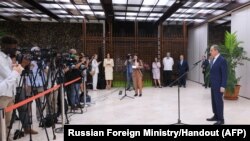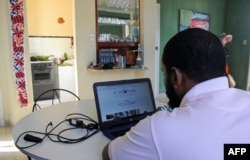For journalists working at one of Cuba’s few independent media outlets, the job comes with threats, accusations of being CIA agents, and pressure to be silent or to leave.
Journalists at 14ymedio.com suffer constant intimidation from Cuban state authorities, said Yoani Sanchez, one of the site’s founders.
Police call the journalists “mercenaries” or agents of the CIA and make threats or bully the team’s families, she said. They are told that their relatives will lose their government jobs if the journalists continue working for 14ymedio.
In some cases, reporters are pressured to leave Cuba forever by the political police, a law enforcement unit that focuses on perceived threats to the state.
Despite the tough environment, members of the news site’s team have not given up their dream, Sánchez said.
“We insist on carrying out independent journalism. In 14ymedio we have lots of dreams,” she told VOA from Cuba. “We want to report on the great process of liberalization of our country, which will happen one day. The Castro regime will fall one day.”
The news site takes its name partly because it was set up in May 2014, and partly from Sanchez’s dissident blog Generation Y.
14ymedio is one of a handful of independent media that report on events in the Caribbean Island.
Others are eltoque.com, revistaelestornudo.com and periodismodebarrio.org.
These independent websites started after mobile internet arrived in Cuba in 2018, followed the next year by the authorization of domestic WiFi networks.
And while 14ymedio is a news website, the team also produces podcasts. As of May, it had 604,200 monthly unique users, according to Google analytics.
Most of that audience is inside Cuba, with the second largest group in Spain, followed by exiled Cubans in the United States.
With a staff of five in Havana, reporters in cities outside the capital, and a bureau in Madrid, the site strives to cover domestic and international affairs.
But with pressure from the government creating a safety risk, journalists inside the country cannot use bylines, says Sanchez.
“The pressure and bullying is very diverse. There is constant verbal aggression. They call us mercenaries or say that we are working for the CIA. They watch us. They come to our offices and stop us from leaving,” she said.
“Reporters have been arrested. [The police] have taken mobile phones, laptops. Or they put pressure on the families of our reporters. They bother parents or children. Another object of the political police is to pressurize them to leave the country or prevent them from leaving the country.”
Cuba’s International Press Centre in Havana — the government body that handles media queries and grants visas to foreign press — did not reply to email requests for comment from VOA.
Sanchez said 14ymedio was formed to report on what is really happening in Cuba rather than accepting the version presented by state media.
“Lots of the problems in Cuban society are due to the lack of a free press to keep people informed so that they can make good decisions,” she said in a voicemail to VOA.
“Journalism could shed light on the real Cuba and 14ymedio was formed with the idea that in Cuba we needed a quality media which was not politically biased.”
An example of that is a recent story the site ran, in which it contrasted Russian and Cuban reports about record trade between both countries.
After consulting experts, the news site reported that state claims could not possibly be true, said Bertrand de la Grange, the Madrid bureau chief of 14ymedio.com.
For other stories, de la Grange said, the site’s journalists get anonymous tips from government sources.
“We also get the odd reader in East Timor or other parts of the world. These must be doctors who are working as part of a Cuban overseas mission or diplomats who pass us information. These people provide us with very useful information,” de la Grange told VOA in an interview.
The website’s content puts the staff at risk of harassment. But de la Grange said the core staff of reporters at the Havana office or around the island refuse to be intimidated.
“They believe in what they are doing and think that maybe what they are doing will help bring change in Cuba,” de la Grange said.
Still, it can be a struggle to replace staff.
“We are in the process of looking for more reporters in the provinces in Cuba. The great problem that we have is emigration. Many people emigrate from Cuba,” de la Grange said.
Cuba’s media find internet access to be expensive and unreliable. Sanchez replied to written questions from VOA with voicemail because the cost of accessing the internet for a video or voice call would cost too much.
Another issue: restrictive laws and regulations.
De la Grange told VOA that the Law of Social Communication in Cuba, passed by the parliament last month, introduced even more restrictions on independent journalism.
The law says media are the “socialist property of the entire people or of political, social and mass organizations and cannot be the subject of any other property.”
The Cuban government said the law was needed to prevent “subversion.”
Reporters Without Borders condemned the law as “a terrible day for journalism in Cuba.”
“By enshrining the ban on any media organization outside the framework of the state and the Communist Party control, the Cuban parliament has crushed the fragile space for freedom that had emerged and has tightened the clampdown on press freedom in Cuba,” RSF said in a statement.
The Paris-based watchdog ranks Cuba as one of the 10 worst places for media freedom globally.
Despite the curbs, Sanchez said 14ymedio remains true to its vision.
“This quality of journalism requires using more diverse sources. If you read it in 14ymedio it is because it has happened. It is serious journalism in which you can have faith.”





